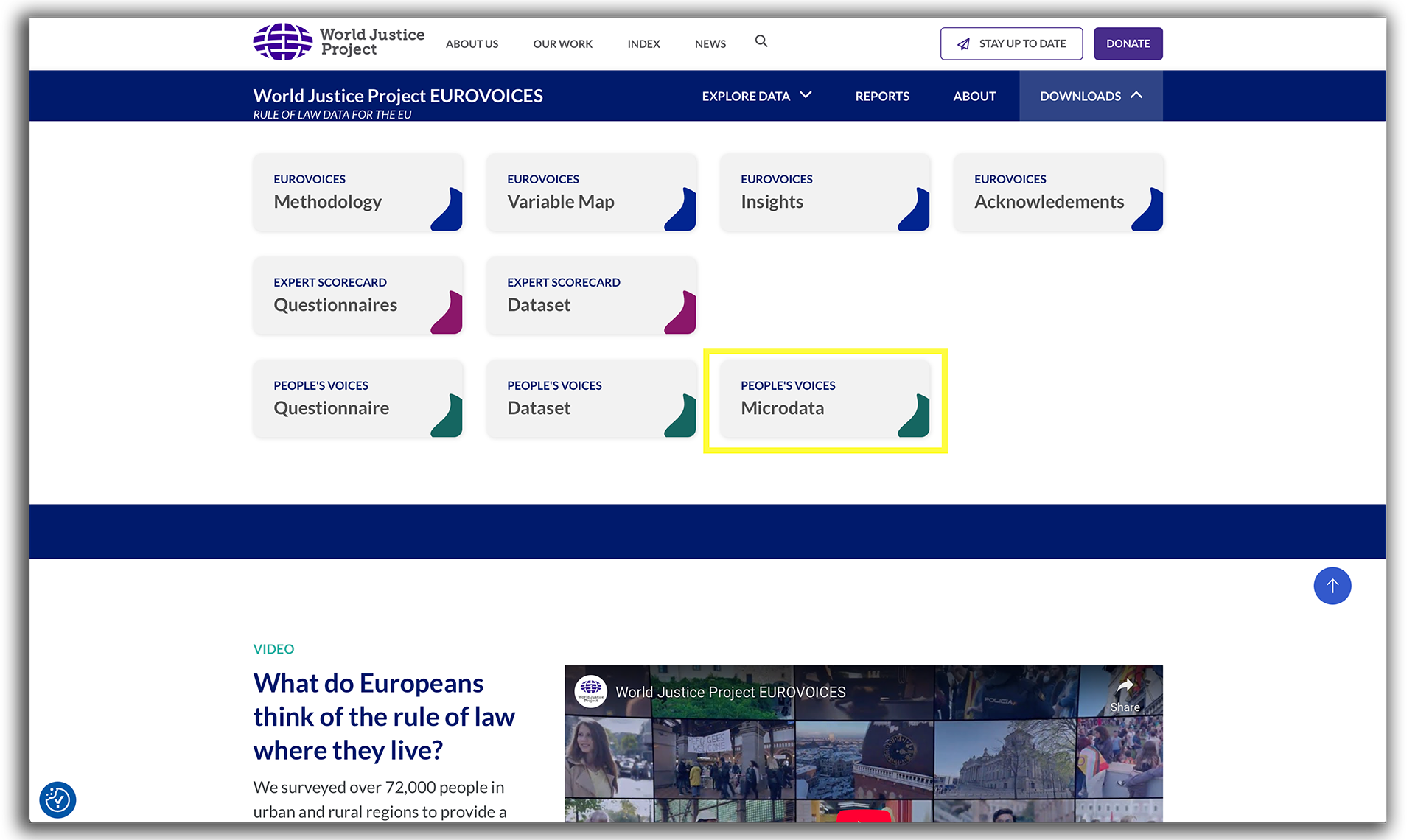
"People's Voices" microdata from the WJP EUROVOICES survey, features detailed, anonymized responses from over 64,000 individuals across 110 EU regions on justice, governance, and the rule of law. Access granular data for deep analysis and evidence-informed strategies.
The World Justice Project (WJP) is releasing microdata for the first time, drawing on data from the WJP EUROVOICES general population poll (“People’s Voices”). It features detailed, anonymized survey responses from more than 64,000 individuals living in 110 subnational regions across the 27 European Union (EU) Member States.
This individual-level data includes more than 150 variables measuring people’s experiences and perceptions in the areas of justice, democratic governance, and the rule of law. The survey explores critical issues such as trust in institutions, fundamental rights, justice and safety, discrimination, transparency, corruption, and civic participation.
This granular data, at the respondent level, enables users to conduct deeper analysis, define demographic categories, and compare results across countries and across subnational regions (using the Nomenclature of territorial units for statistics, or NUTS, at the NUTS1 and NUTS2 level).
With WJP EUROVOICES microdata, researchers will be able to conduct multivariate regression analysis, develop new variables, and explore responses by different population groups to uncover inequalities or regional disparities. For example:
- Exploring the relationship between trust in institutions and individuals’ experiences of discrimination or safety
- Analyzing perceptions of corruption with regards to age group or interest in politics
Upholding the rule of law requires implementing evidence-informed strategies tailored to meet the diverse needs of people across different contexts. In this way, this data supports evidence-based decision-making at all levels of government by allowing decisionmakers to identify strengths, weaknesses, and policy priorities.
Microdata: The microdata and codebook for “People’s Voices” are available for download at https://eurovoices.worldjusticeproject.org/

WJP EUROVOICES lets you explore rule of law indicators by respondent type— legal experts or the general public. Dive into the data and filter by country, region, income group, and gender. For deeper insights, you can also access our full EU Country Reports and specialized reports on Democracy & Fundamental Rights, Justice & Safety, and Transparency & Corruption.
If you have any questions or need additional information, please contact our team at [email protected] and if you do publish work using this data, we would love to hear from you!
About WJP EUROVOICES: Visit WJP Eurovoices. (link) to consult the project’s thematic reports, and download the methodology and tabulated data for the household and expert surveys, which were published in November 2024.
About People’s Voices: WJP EUROVOICES presents original survey data from two sources: expert surveys (“Expert Scorecard”) and household surveys (“People’s Voices”), answered by the general population. Household survey data collection was conducted by leading local polling companies: ACT (Croatia, Latvia, Lithuania, Poland, and Romania), Alpha Research Ltd. (Bulgaria), Bilendi & Respondi (Austria, Belgium, Denmark, Germany, Italy, and the Netherlands), D3 Systems, Inc. (Greece), ILRES (Luxembourg), Intercampus (Portugal), Ipsos (Czechia, Estonia, Finland, France, Slovenia, Spain, and Sweden), Misco International (Malta), Pulse Market Research (Cyprus), RED C Research (Ireland), and Talk Online (Hungary and Slovakia). The questionnaire was designed by the WJP team and benefited from consultations with experts from various sectors, including academia and international organizations.
The survey was translated into over 20 local languages, adapted to common local expressions, and administered in pilot tests in each country. After conducting, reviewing, and validating the pilot tests, the survey was administered to respondents in 110 regions of the 27 EU Member States, using both face-to-face (in 10 countries) and online (in 17 countries) polling methodologies. Survey respondents in each country were selected through a probability sampling method that ensures representativeness based on age, sex, income level, and degree of urbanization. During the full-fieldwork stage of data collection, which took place between December 2023 and April 2024, a total of 64,089 EU residents were surveyed.






